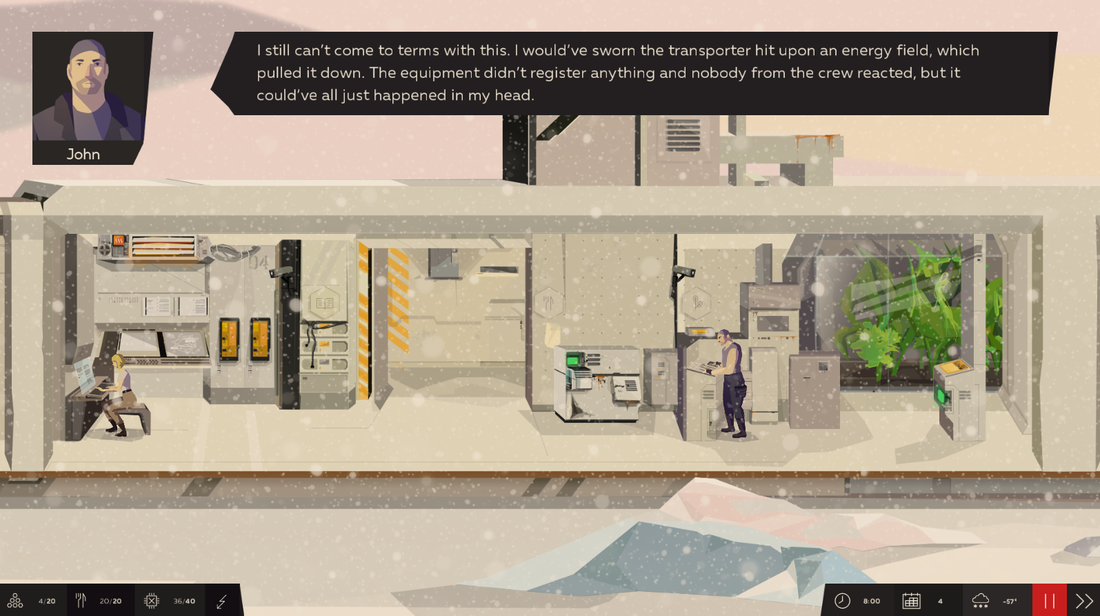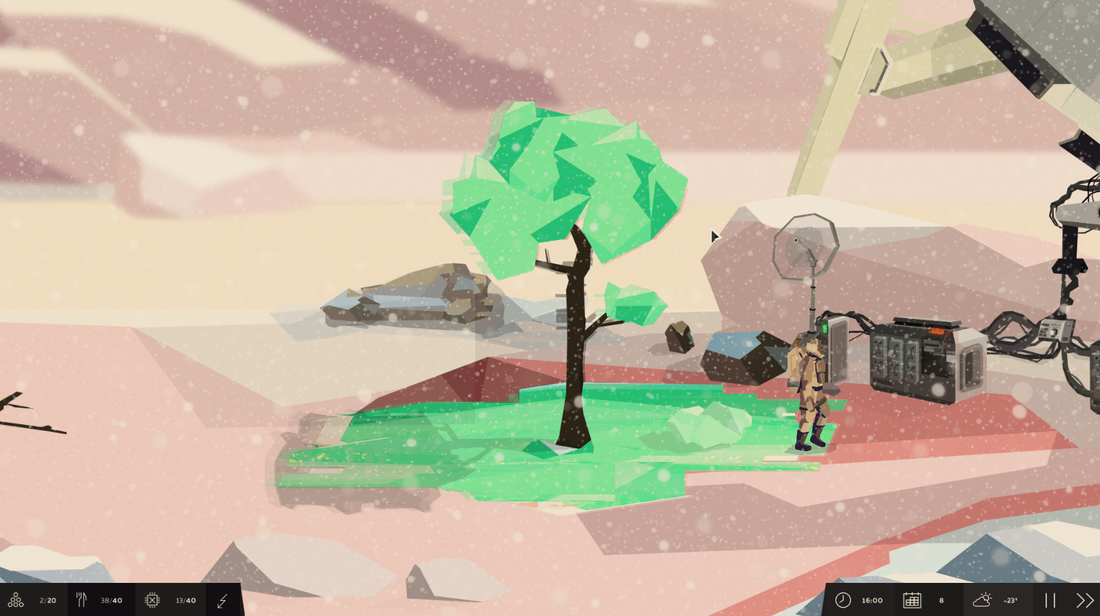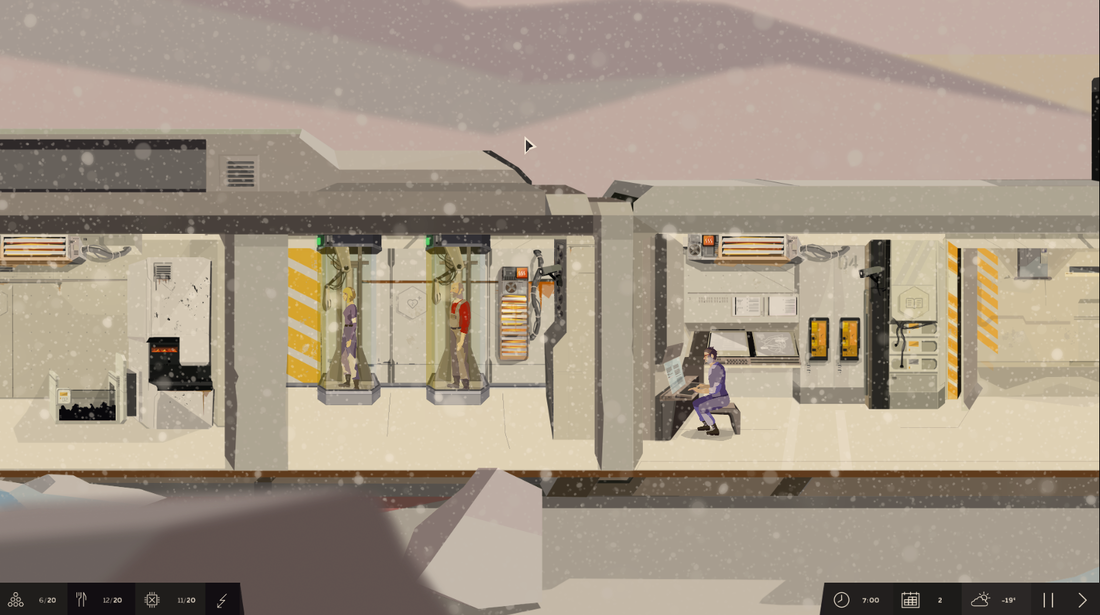 At its core, Symmetry is an extremely simple game. Like other survival sims of its type, you're tasked with monitoring the status of a small handful of people and using them to collect resources to keep themselves alive and ultimately escape their circumstances. Symmetry boils those systems down to the essentials. Your crew members have two stats: health and hunger, which they keep topped off by sleeping or eating. They have to gather three resources: wood, food, and scrap, which they use to heat the base, eat, and repair or upgrade stations, respectively. That essentially forms the whole basis of the game, with really only one complicating factor: cold. Your intrepid spacefolks find themselves stranded in Arctic conditions and nearly every decision needs to be weighed against the risk of freezing to death. To keep the base heated, someone has to gather wood from outside, where their health drops more rapidly. At first it's not a big problem, but the more wood the crew gathers, the farther they'll have to go to find more trees, putting themselves at ever-increasing risk of getting stuck too far out when a lethal cold snap hits. Wood burns quite quickly, meaning you'll either have to stockpile it or keep a near constant supply of lumber coming in. The crew can survive some time in a freezing base by making use of the regeneration chambers, but that keeps them from doing other work and it can get dicey when you have fewer chambers than you do people needing help and you have to play musical chairs for healing. I found this reliance on a steady stream of lumber to be mostly just an irritation. There are no breaks in the weather that allow you to ‘tough it out’ without the heater for a while, and no way to turn the furnace off to conserve fuel for when you need it most. The facility your crew inhabits is static as well, with no way to upgrade anything aside from the storage capacity for your various resources. I would have liked the option to improve my base a bit, maybe by adding additional health pods or food stations, increasing heaters' efficiency, or making machines less likely to break down. And boy would that last point go a long way. Making it out alive means stockpiling scrap to spend on a few expensive systems, but that scrap is constantly being depleted to repair systems. Like wood, it takes longer to gather the more of it you've already collected, but the escalation is considerably more drastic. You're constantly using the scrap that you wanted to use for upgrades just to keep the base running. It's a staple of survival games, but I just found the economy of it off in this case. I had scenarios late in the game where a series of cascading breakdowns reduced the hoard of scrap that I'd been saving the whole playthrough down to near zero in one swoop, with nothing I could have done to prevent it. The list of components that can fail is immense (power supply, weather station, healing pods, food generator, refrigerator, furnace, and a radiator in each room) and it's almost always a life-threatening emergency when one stops working. I kept wishing that the game gave the player more leeway to decide which components they found critical and formulate a strategy around them. If I were making a wishlist, a Faster Than Light-style system of strategically diverting power would be near the top. At the very top would probably be improvements not to machinery, but to the people who tend to it. Symmetry does distinguish its characters much more than the average survival sim, but the thin layer of personality it paints onto them almost makes their ultimate hollowness more noticeable. Throughout the game, crew members will spout dialogue to no one in particular that helps define them as characters and advance the nebulous plot. While some elements of the story are interesting, nothing ever gets fully fleshed out. Especially disappointing is a late game turn that seems to promise a severe change of plans for the crew, but fizzles before being resolved. I'm all for game narratives that aren't completely spelled out for players, but Symmetry tends to just let plot threads hang in the air. What really keeps the story from ever getting interesting is that the characters themselves never interact or build off of each other. There is hardly any indication that they're even aware of one another. The first time I had a crew member die, I was floored by the grim choice the game presented. Either bury the body, or use it to feed the remaining crew. I was wracked with guilt, but ultimately decided to go the utilitarian route. In a nice touch, the floor around the refrigerator became stained with blood for a while, but that was the only acknowledgement of what I'd done. The dead man's comrades just sprinkled a little Jacob on their cereal and went on with their day. Some sense of characters building relationships and working together would have made them much more interesting than the drones they seem to be for most of this game. The eerie blankness of the characters plays out mechanically as well. Crew members will continue doing whatever job you assign them until you change their orders, no matter what. They will mindlessly wander into -90 degree weather with their health almost depleted, then quickly freeze to death without a single word of complaint. There's also no way to simply cancel their orders and have them standby for further instruction. So when storms hit and you have characters who can only do gathering jobs outside the base, you're stuck following them around and ordering them to walk from one end of the structure to the other to keep them from walking themselves to certain death. This kind of tedious micromanagement gets more and more important as the game goes on, until in the end you're just babysitting a bunch of brain dead astronauts with a death wish. All other problems aside, the tedium is what really kills this game for me. That being said, I did play through the game a number of times. The gameplay is certainly addictive, though I wouldn't necessarily call that a good thing. But it does always seem like there's something interesting just around the corner, like if you do things right then next time you'll crack it. I can definitely see some people enjoying the extreme difficult of the game, but there was simply not enough payoff for me. That's kind of a shame, because Symmetry certainly has promise. Despite the lack of a really interesting story, it does some interesting environmental storytelling. The graphics have a low-poly charm, and the sound does a great job of maintaining tension even when there's not much going on. But all of that is just window dressing for an experience that asks a whole lot of players and gives almost nothing in return. The atmosphere of the game keeps making me want to go back, but I know I don't think I would find anything new on my return.
0 Comments
Pinstripe charts a difficult course for itself. Created by solo developer Thomas Brush (you may remember his Newgrounds hit, Coma) over a five-year period, it tries to tell the tale of a father's attempt to atone for past mistakes and rescue his daughter through the medium of a combat-light puzzle platformer. It's not an impossible task, as demonstrated by similar games such as Limbo or Braid, but it requires a tightrope walker's precision to successfully balance presentation, story, and mechanics. From its opening moments, Pinstripe nails the presentation, but falls flat on its face otherwise.
The game begins promisingly, as falling snow and a lilting score fade into a scene of a father (Ted) and daughter (Bo) aboard a train car. The pair engage in some banter that should immediately endear them to most players -- not a simple task given how stilted and unnatural these relationships often come across onscreen. The paper cutout visual style is clearly inspired by the likes of Edward Gorey and Tim Burton, but it's distinct enough to stand on its own rather than just being a pastiche. Your own taste will dictate how you feel about the game's appearance, but the art is undeniably well crafted throughout. Gentle music continues playing and remarkably rich sound effects complete the picture of the journey. Making their way through the rattling train, players will quickly come across the game's antagonist and namesake, Mr. Pinstripe. Pinstripe is genuinely unsettling, projecting menace in his design, his voice, and the incredibly creepy dialogue with which he introduces himself. After solving a brief puzzle and interacting with one of Pinstripe's addictive but noxious "sacks" (don't look at me, that's what they're called), which will come into play later in the game, Ted is called to action by Bo's abduction. Players are greeted here by a gorgeous and dark landscape. The burning wreckage of a train lies strewn across the snowfield that makes up the game's first section. Snowflakes fall in the foreground, lending a serene beauty to the carnage. Elevating the atmosphere is the sparse but surprisingly moving soundtrack -- the music is great throughout, but this simple tune may be my favorite part of the entire game. A similarly lovely track accompanies the ending, which provides an unexpected bookend to the adventure. Up to this point, Pinstripe looks promising. It quickly establishes a nightmarish fairy tale world haunted by a malevolent spectre for our likable hero to overcome, and it's all presented with a grim beauty. Up to this point, players have only had presentation to rely on, and that is the game's biggest strength. But as soon as Pinstripe starts in earnest, the game's lackluster mechanics completely hamstring it. Players may have brushed aside the one quiet alarm bell of the first scene -- the simplistic and dull opening puzzle -- and assumed that it only gets better from here. Unfortunately, the gameplay never finds its footing, and players who have been even half-awake so far have already seen everything the story has to offer. Pinstripe is primarily a puzzle game, but its puzzles are uniformly unimaginative and provide nothing but a slight pause in progress. Most puzzles take the form of a series of switches to be pressed in the environment to open a gate. There are no complex sequences or tricky timings; in most cases you'll stumble across at least one switch before even finding the puzzle it belongs to. Another common puzzle is finding clues that form the combination to a lock. At one crucial juncture, you're forced to play a couple rounds of a Flappy Bird knock-off with worse collision detection, and the game even contains a couple of "Highlights" magazine-style spot-the-difference puzzles. There are a few slightly trickier puzzles to work through, but they're no more satisfying to solve. Combat, the other gameplay pillar, hardly bears mentioning. There are two types of bomb-dropping airborne enemies, which are functionally identical but with different sprites. You shoot them with a slingshot that has a simple but unsatisfying control scheme. There is one ground-based enemy that charges at you. Your talking dog companion (we'll get to it) tells you to jump on its back, so you do. This enemy shows up twice in the game. The game's only boss shows up at the very end, and it's actually a decent battle compared to the rest. It's nothing special, but it's the only encounter that requires any thought or packs any emotional resonance. So about that dog. Ted, being in Hell, is guided through most of the game by his dead dog, George. I don't know what a dog does to get sent to Hell, but that's beside the point. George is delightful. It's a clever, funny variation on Dante's Virgil, and the voice performance by musician Nathan Sharp is unerringly charming. In fact, the game's voice acting is fantastic across the board, with the highlights being the malice-dripping Mr. Pinstripe and a sort of robotic desk clerk encountered near the game's end whose voice is tinged with unnerving static and distortions. The same level of care and inventiveness goes into the sound design throughout the game, which features well done sound effects, judicious use of audio filters, and clever sound cues that help amplify the game's tense, creepy tone at key moments. This may be the first game I've ever played where the sound was undoubtedly my favorite aspect. Unfortunately, this bright spot can't make up for the game's awkward pace. Neither combat nor puzzles provide any real hurdle to the player's progress, which keeps things moving at a fast but unrewarding clip. This all grinds to a halt around two-thirds of the way through the game when, to progress to the final stage, an NPC tasks you with retracing your steps to gather a truckload of previously inaccessible pickups. This bit of exploration and puzzle solving provides probably the most significant challenge of the game, but having to trek back through old environment for a fetch quest is incredibly irritating. From this point essentially to the end of the game, my tolerance wore thin and I was ready for the ordeal to end. This harsh break in the game's flow is indicative of the way it handles narrative in general. You have a clear task to accomplish -- rescue Bo from Pinstripe -- but none of the steps you take to get there feed directly into that goal. Instead, you're jumping through whatever unrelated hoops the game chooses to put in front of you, just hoping that you'll be closer to your daughter once you do. Without a sense of escalation, the game's narrative hangs limp, allowing you to almost forget that the point of all this is to rescue a kidnapped child. Mr. Pinstripe himself even begins to undercut the game's tone as he inexplicably speaks like an angry teenage YouTube commenter, flinging sophomoric jabs like "douche" at Ted in what would otherwise be pivotal emotional encounters with his nemesis. The game's lore is revealed in a similarly halting fashion. Throughout the game, you'll stumble upon a variety of totems from Ted's past that reveal his life leading up to the events of the game. This could be a powerful narrative device, but finding these items isn't tied to the action in any satisfying way. They're mostly just lying around waiting to be picked up, and the lore revealed by these items is so readily apparent from the game's start that I wasn't sure if they were supposed to be revelations or not. Either way, they're doled out seemingly at random and land without any impact. Ted's story of guilt and redemption was supposed to be this game's selling point, but the story and the game's mechanics are so separate that they never add up to a coherent whole. One can certainly feel for the protagonist, but the game does nothing to establish his character, and everything interesting about his story happened before the game began. Within the game itself, everything is static, a redemption story without an arc. Even after writing this review, it's hard for me to pin down my feelings about Pinstripe. I don't hate it, despite the negative review, but I certainly didn't enjoy it. I found it boring and lacking in any sense of cohesion, but there are elements of it that do deserve praise. It's an original game that's trying to do and say something different, and that ought to be commended. For a one-person team, it really is quite a feat. I'll be keeping an eye on how Brush's next project, Once Upon a Coma, turns out, because there is a lot of promise in what he's made up to this point, even if it's fallen flat. And I can't overstate how much I loved the presentation. Setting aside some stiff animations, Pinstripe looks and sounds incredible. I can't recommend picking the game up, but I don't regret having sunk a few hours into it either. Pinstripe's opening and closing scenes are legitimately touching, and they've been running through my head since I finished the game. I just wish the journey between the two had been more fulfilling. |
Archives
May 2018
Categories |


